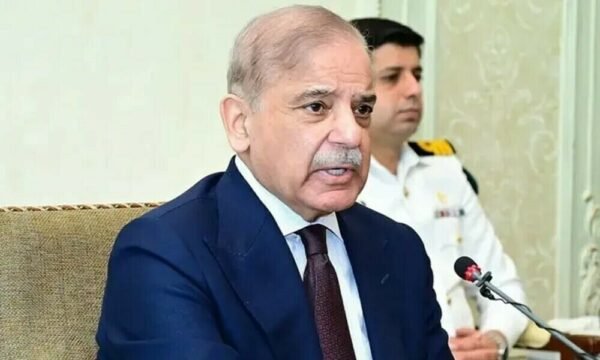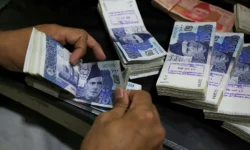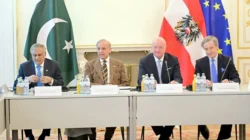TEAM PAKISTAN CAN TURN AROUND THE ECONOMY OF PAKISTAN

Maria Mansab
12 June 2024
[tta_listen_btn listen_text=”Listen” pause_text=”Pause” resume_text=”Resume” replay_text=”Replay”]In a promising turn of events for Pakistan, the nation’s economic landscape is showing signs of robust recovery. Under the astute leadership of Prime Minister Shahbaz Sharif and Finance Minister Muhammad Aurangzeb, Pakistan is poised to overcome its economic challenges and set a course for sustained growth. A recent report “Pakistan’s economy to rebound in 2024” by Bloomberg economist Ankur Shukla projects a growth of 2.1% for the current fiscal year, with a significant acceleration to 4.8% anticipated in fiscal 2025. This optimistic outlook is a testament to the government’s concerted efforts and strategic reforms.
Several positive indicators underscore Pakistan’s economic recovery. Pakistan’s trade deficit has decreased by 34.70 percent in the first four months (July-October) of the fiscal year 2023-24. It now stands at $7.416 billion, compared to $11.356 billion during the same time in the previous fiscal year 2022-23. This remarkable improvement was partly driven by a substantial increase in exports to China, which surged by 66.4%. The Consumer Price Index rose 3.2% for the 12 months that ended in October, down from 3.7% in September, and clocking in at the lowest annual rate since March 2021, according to the Bureau of Labor Statistics.
In a remarkable turnaround, Pakistan’s current account revealed a surplus of $9 million in November 2023, a stark contrast to the $157 million deficit recorded the previous year, according to the State Bank of Pakistan (SBP). This surplus is attributed to a significant increase in the country’s exports and remittances, as well as a decrease in imports. According to SBP data, the country’s exports (goods and services) increased by 12% in November 2023 to $3.364 billion, up from $2.999 billion in November 2022.
Inflation, a significant concern in recent years, is expected to slow to 24% in 2024. In March 2024, Pakistan witnessed a notable downturn in inflation, marking a 23month low primarily attributed to the base effect. General inflation dipped to 20.7%, down from 23.1% in February, and a significant drop from 35.4% recorded in March
2023. The government’s proactive efforts to reduce retail petrol prices since October, coupled with lower global crude oil prices, are anticipated to contribute to further price stabilization. These measures indicate a commitment to ensuring economic stability and affordability for the general populace.
The State Bank of Pakistan (SBP) has played a crucial role in addressing inflation and currency stability. In the first half of 2023, the SBP implemented a substantial 600 basis points increase in its key policy rate, raising it to 22%. This aggressive move was aimed at curbing inflation and stabilizing the currency. Looking ahead, the forecast suggests a significant policy shift, with a projected reduction of 700 basis points, bringing the policy rate down to 15 percent by the end of 2024. This anticipated reduction reflects confidence in the stabilization measures and the overall economic outlook.
The establishment of the Special Investment Facilitation Council (SIFC) under the vision of COAS Asim Munir has been a game-changer in addressing administrative and economic issues. By tackling challenges such as energy mismanagement and the misuse of trade agreements, the SIFC has helped stabilize the Pakistani rupee and improve overall economic conditions. These reforms have been instrumental in creating a more conducive environment for investment and growth.
The Reko Diq project stands as a beacon of hope for the economic advancement and development of Pakistan under the SIFC Forum. With Barrick Gold’s anticipated investment of $10 billion, alongside projections of substantial copper and gold yields, this initiative is poised to create significant employment opportunities and stimulate local economies. The project’s emphasis on prioritizing local employment and community development underscores its potential to bring about tangible benefits to Balochistan, including infrastructure enhancements and advancements in healthcare and education. Moreover, the interest shown by Saudi Arabia and American firms further validates Pakistan’s attractiveness for foreign investment in its mineral sector, highlighting the country’s potential for economic growth and stability. As Pakistan continues to navigate towards harnessing its mineral resources for long-term prosperity, the Reko Diq project stands as a pivotal step toward realizing this vision.
In April 2024, the net Foreign Direct Investment (FDI) in the country increased to
$359 million, marking a 172% growth compared to the FDI of $138 million in the same month of FY23. The Pakistani government is carrying out an active foreign investment promotion policy and has taken several economic liberalization measures to make the country more attractive.
In a bid to promote sustainable energy use and reduce reliance on diesel, the government has allocated significant investments towards shifting agricultural tube wells to solar energy. This initiative, receiving Rs30 billion, targets the installation of 50,000 solar-powered tube wells. Such measures not only support environmental sustainability but also enhance energy efficiency and cost-effectiveness for the agricultural sector.
Agriculture, being a cornerstone of Pakistan’s economy, has received considerable attention and support. The Kissan Package has been expanded from Rs1,800 billion to Rs2,250 billion to aid farmers affected by floods and improve crop yields. Additionally, exemptions from customs duty on agricultural machinery and inputs, alongside sales tax exemptions on various agricultural products, have been introduced to reduce costs for farmers. The government has also allocated Rs5 billion for concessionary loans to agro-based industries and Rs10 billion for mark-up subsidies under the PM’s Youth, Business, and Agricultural Loan Scheme. These measures reflect a comprehensive approach to bolstering the agricultural sector and supporting rural development.
The Green Pakistan Initiative, led by the COAS Asim Munir, has made significant strides. The GPI aims to reclaim 4.8 million acres of barren land for agriculture, with over 100,000 acres already cultivated and plans for livestock farms. Collaborating with universities and research centers, it has established 16 agriculture complexes and implemented the Land Information and Management System (LIMS), covering 680,000 acres. Projects in regions like Balochistan have seen 4600 acres cultivated, with plans for 225,000 more in the next 2 years. With a goal of $5-10 billion in livestock exports, the Green Pakistan Initiative signifies Pakistan’s resilience and commitment to a sustainable future.
The remarkable strides in Pakistan’s economic recovery are largely attributed to the dynamic leadership of Prime Minister Shahbaz Sharif and Finance Minister Muhammad Aurangzeb. Their strategic vision and unwavering commitment to economic reform have been instrumental in navigating the country through challenging times. The duo has been lauded for their proactive measures and effective governance, which have laid a strong foundation for sustainable growth.
Under their leadership, Pakistan is not only addressing immediate economic challenges but also laying the groundwork for long-term prosperity. Their efforts in securing international support, implementing critical reforms, and fostering a conducive environment for investment have positioned Pakistan on a promising path to recovery.
As Pakistan continues its journey towards economic recovery, the signs of progress are becoming increasingly evident. The collaborative efforts of the government, supported by international partners and strategic reforms, are paving the way for a brighter economic future. With the steadfast leadership of Prime Minister Shahbaz Sharif and Finance Minister Muhammad Aurangzeb, Pakistan is well on its way to achieving sustained growth and prosperity. Their remarkable work is a testament to the resilience and potential of the Pakistani economy, inspiring confidence and optimism for the years ahead.





